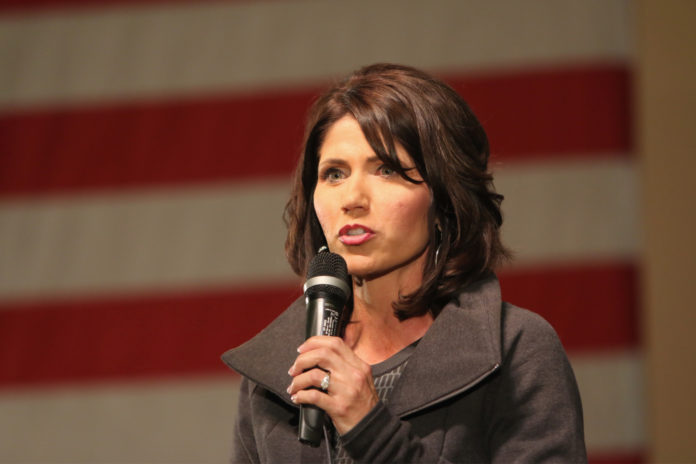PIERRE, S.D. – South Dakota Governor Kristi Noem (R-SD) is digging in her heels in a legislative battle against any form of industrial hemp legalization.
In an op-ed published in the Wall Street Journal, Gov. Noem vowed to veto any hemp legalization bill that reaches her desk. Although industrial hemp has been legalized by the Agricultural Improvement Act of 2018 (farm bill), Gov. Noem is taking a hard stance against the crop and views hemp as a gateway to legal cannabis. The governor’s op-ed is not the only time she has recently come out strong against industrial hemp. Two weeks ago, in her weekly local newspaper column, she clearly described her feelings on the issue.
“Legalizing industrial hemp legalizes marijuana by default,” Gov. Noem bluntly said. “I asked my cabinet and other experts in state government to see what other states are doing on hemp and how they are implementing their laws. But what they’ve come back with is example after example of drug laws becoming murky and unenforceable.”
The governor is citing a recent issue in Texas. Industrial hemp and CBD were legalized but no additional funds were allocated by Gov. Abbot to purchase testing equipment that can differentiate between THC dominant cannabis and industrial hemp containing 0.3 percent THC or less.
A legislative battle over legal hemp between state lawmakers and Gov. Noem has been brewing for months. In March, Gov. Noem vetoed HB 1191, a bill that would have legalized industrial hemp in South Dakota. State lawmakers attempted to override her veto but came up just four votes short.
The governor’s stance could be a shot across the state legislature’s bow. The 2020 legislative session is still months away but Gov. Noem already is carving out a rigid stance, signaling an unwillingness to compromise or show any flexibility on the issue.
Even if state lawmakers can muster the votes to override another veto by the governor, the earliest farmers could plant hemp crops would be July 2020. This is considered to be too late in the growing season and farmers would have to wait until spring 2021. With farmers in need of new profitable crops, especially as many have taken a hit from President Trump’s trade war, the governor’s position could become highly unpopular. Despite this, Gov. Noem said she is taking the plight of farmers into consideration.
“As a farmer and rancher, I would be thrilled to get a new crop into the hands of our producers, especially as our ag markets struggle,” Gov. Noem said. “A new source of revenue for farmers would be great. But industrial hemp is not the answer.”
The governor may make a semi-compelling case regarding the difficulty of identifying the differences between hemp and cannabis by eye, but she could push for investment in equipment and laboratories that could properly make these determinations. She does not seem inclined toward such an investment, and both Gov. Noem and her spokesperson are quick to pivot to a moral crusade narrative, a narrative that features some of prohibition’s greatest hits.
Industrial hemp and legal cannabis have the ability to provide job growth and relief for patients without ushering in the crumbling of modern civilization. However, the Governor’s office is implying that Americans are now experiencing buyers remorse when it comes to legalization, despite polls showing growing support for cannabis years after Colorado and Washington first legalized recreational use.
“As other states begin to see the social impacts of legalized marijuana and wonder if there is another way, she wants South Dakota to be ready to show them there is,” Kristin Wileman, spokesperson for Gov. Noem recently wrote. “The pendulum on legalized weed will eventually start to swing back the other way.”
With regards to the governor herself, she has been promoting the ol’ “what about the children” argument in her case against legalizing hemp.
“As a governor who has said I will make every decision with the next generation in mind, I cannot sit by,” she said in her column. “South Dakota must lead by example. We cannot rush into legalizing industrial hemp without knowing the cost we will pay. The safety and health of the next generation is not worth the gamble.”


